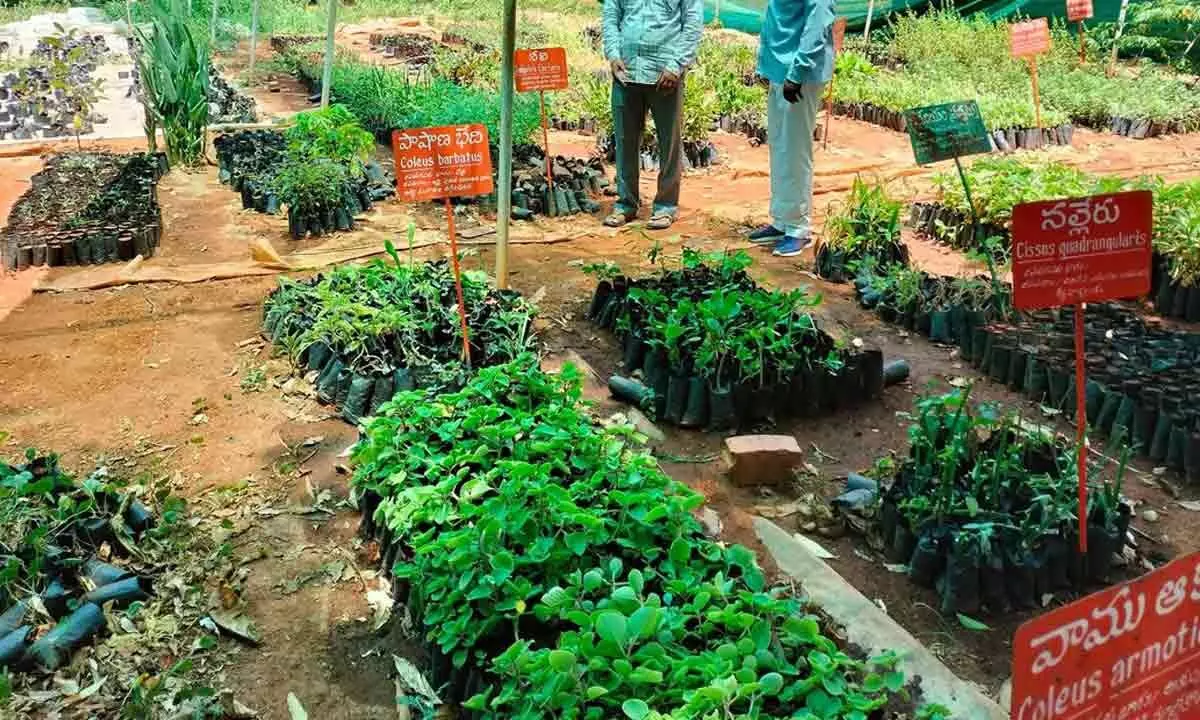Live
- Are strict laws needed to ensure MLAs attend Assembly sessions?
- Special prayers held at Devatparambu ahead of Kodava National Day
- Theft in Tirumala temple’s hundi caught on camera
- Sharmila takes out rally to mark Constitution Day
- Bypoll results not a mandate for the State govt: Bommai
- Deputy CM seeks increase in estimates in NREGS works
- SIT focuses on irregularities in quality ghee supply to TTD
- Take Maha win as inspiration, forget bypoll defeat: BJP chief
- Former Makthal MLA Chittem Rammohan Reddy Taken into Custody Amid Protests Concerns
- Man stabs lover in apartment, spends day with the corpse
Just In
Medicinal and Aromatic plants research station wilts under neglect


Medicinal and Aromatic plants research station wilts under neglect
- Established in 1989, the station raises awareness of medicinal plants
- 30 acres cultivated with 150 medicinal plants and fruit saplings
Rangareddy: Due to a lack of interest from farmers in establishing nurseries for medicinal plants and a lack of government oversight, the Medicinal and Aromatic Plants Research Station in Rajendra Nagar appears abandoned, devoid of the vibrant assortment of seedlings it was meant to nurture, as well as an adequate workforce to fulfill its purpose.
Situated a short distance from Aramgarh crossroads on the outskirts of the city, this establishment operates under the guidance of Sri Konda Laxman Telangana State Horticultural University (SKLTSHU). Established in 1989, its primary objective is to raise awareness among farmers and provide them with training regarding the significance of cultivating plants possessing medicinal and aromatic properties, with the ultimate aim of promoting their cultivation throughout the State.
In the sprawling 60-acre land allocated to this facility, only 30 acres are currently utilised for the cultivation of approximately 150 plants, saplings, and seedlings of medicinal and aromatic species. In addition to these, the station also houses a small number of fruit-bearing and miscellaneous saplings.
Dr T. Suresh Kumar, the Principal Scientist at the Medicinal and Aromatic Plants Research Station in Rajendranagar, provided insights into the variety of species present at the facility. Currently, there are 125 medicinal plants, along with 25 fruit-bearing and miscellaneous species, all encompassed within the same premises. In accordance with their mandate, the station frequently organises training programmes for farmers across various locations, emphasising the significance of medicinal and aromatic plants and their practical applications in everyday life.
He further highlighted the importance of aromatic plants in the production of soaps and cosmetics. Varieties such as lemon grass, citronella, eucalyptus, davana, mint, jasmine, tuberose, and sandalwood are vital in this regard. The research station possesses its own distillation unit, which is utilised for extracting oils from plants with medicinal and aromatic properties. For instance, lemongrass oil obtained from the distillation process is employed in the production of perfumes used in different grades of soaps and cosmetics.
Adding further, he mentioned that the research station also focuses on propagating plants with medicinal properties, specifically aloe vera, amla, ashwagandha, Isabgol, Kalmegh, safedmusli, senna, and sacred basil. Individuals, particularly plant enthusiasts who recognize the significance of these plants, often visit the facility to purchase them.
However, one of the challenges faced by the research station is the shortage of staff. Currently, there are only two laborers working at the facility, compared to the previous staff strength of 12. Recognizing the need for improvement, the official, who joined the facility in February of the current year, explained that proposals are being prepared to revive the facility. The research station possesses a substantial number of saplings of important species with medicinal and aromatic value, further emphasising the necessity for rejuvenation.

© 2024 Hyderabad Media House Limited/The Hans India. All rights reserved. Powered by hocalwire.com






